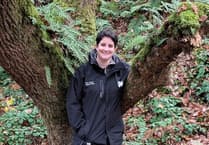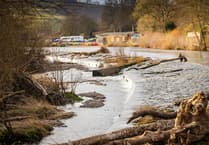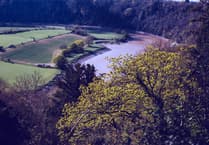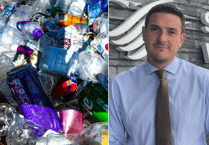The UK Government’s response to the Water Quality Inquiry’s recommendations is ‘ a failure of political leadership’ which spells death for the Wye, according to citizen scientists.
Citizen scientists across the Wye catchment are united in criticising this response as ‘too little, too late’.
The government say they have a target to reduce nitrogen, phosphorus, and sediment pollution from agriculture to the water environment by at least 40 per cent by 2037.
In the Wye catchment, far more dramatic nutrient reduction is required, far more quickly.
The CEO of the Wye and Usk Foundation, Simon Evans, has said that the river may only be two or three years from its entire ecosystem collapsing. For example, over 90 per cent of the ranunculus in the river, the keystone species, has disappeared over the last four years. This is an emergency and targets for 2037 are fifteen years too late. Immediate action is required to drastically reduce the nutrient loadings in the Wye catchment.
The government have rejected the Committee’s recommendation that there should be a ‘presumption against granting planning permission for new intensive poultry or other intensive livestock units in catchments where the proposed development would exceed the catchment’s nutrient budget’. The committee have concerns that the government want to retain the same planning policies which have allowed over 20 million chickens to accumulate in the Wye catchment, fuelling the escalating crisis.
Academics at Lancaster University, as part of the RePhoKUs project, have demonstrated that the Wye has an excess of 3000 tonnes of phosphorus each year – and that livestock manure is the primary driver of this excess. They’ve said that achieving nutrient neutrality will require, for example, removing 80% of the poultry manure plus 50% of the cattle manure plus not applying any phosphorus fertiliser.
Citizen scientists say that we need to be dramatically reducing the nutrient inputs we already have - yet the government won’t rule out adding more.
The Campaign for the Protection of Rural Wales, River Action and the Radnorshire Wildlife Trust have all called for a moratorium on new developments for intensive poultry units.
Dr Tom Tibbits, shair of Friends of the Upper Wye, said: “The Wye catchment already has far more manure than the land can absorb, and yet the government still don’t get it.
“Having given extensive evidence to the Water Quality Inquiry we were glad to see the Committee recommend that planning permission should not be granted for more livestock in catchments exceeding their nutrient budgets.
“The Wye is well in excess of its phosphorus budgets and the river is on the brink of ecological collapse.
“Despite Minister Rebecca Pow’s recent visit to the Wye, she isn’t doing anything to address this crisis. This failure of political leadership could be the death sentence for the Wye.
“The Government’s proposed lack of action on intensive poultry and intensive livestock units will ensure that the River Wye remains the slimy, lifeless, slightly unpleasant smelling watercourse that it has become in recent years. All whilst proudly proclaiming that ‘improving water quality is a priority.’
“As the famous message from the dolphins goes in the Hitchhiker’s Guide to the Galaxy trilogy, when planet Earth is about to be demolished to make way for a hyperspace bypass, ‘So long, and thanks for all the fish.’ We hope that this doesn’t tragically become the epitaph of the Wye.”
Dr Christine Hugh-Jones, Campaign for the Protection of Rural Wales and Friends of the Lugg said: “This shameful procrastination means ‘this year, next year, sometime, never’ for the river Wye.
“So far we have seen none of the required national cooperation between England and Wales over our mutual river catchments and now, in response to the serious informed concern of the Environmental Audit Committee, the English Government is setting a miserable, evasive example.
“Besides 15 years for an inadequate 40 per cent reduction in nutrient pollution and 20 per cent reduction in water consumption, the Government has also awarded itself a whole 8 years to halt biodiversity decline.
“We do not have 8 years. But what does this target mean anyway, when there is a totally contradictory 20-year period to bring only half of our SSSIs into favourable state? These legally protected SSSI habitats include key stretches of the Wye river system.”
Stuart Smith, shair of Wye Salmon Association, said: “It’s depressing to see another report suggesting denial by the government of the basic problems and issues confronting our river. The opportunity to visit the river to fact find at first hand was wasted by Minister Pow’s failure to meet stakeholders and representatives of local NGOs and citizen science groups actively working towards resolving the pollution of the Wye. Rather choosing to talk in the main to the polluters.
“So, another plan of action, begetting another ‘management board’ avoiding the fundamental causes of river pollution and creating a broadbrush approach likely to bury the systemic problems under cross department bureaucracy. The state of our river needs a proper hands-on approach, a special measures approach, cutting through the problems existing today and placing focus on the real problems, regardless of where they sit on the political or cross border divide.”
Nick Day, co-founder of Friends of the Lower Wye said: “In the Lower Wye, the river brings water that is all too often blanketed by catastrophic algal blooms. This results in slimy deposits all over the riverbed, and the success of the algae is to the cost of all the other life in the river. To put a stop to this, all forms of pollution must be tackled, urgently. This governmental response is hopelessly inadequate.”





Comments
This article has no comments yet. Be the first to leave a comment.